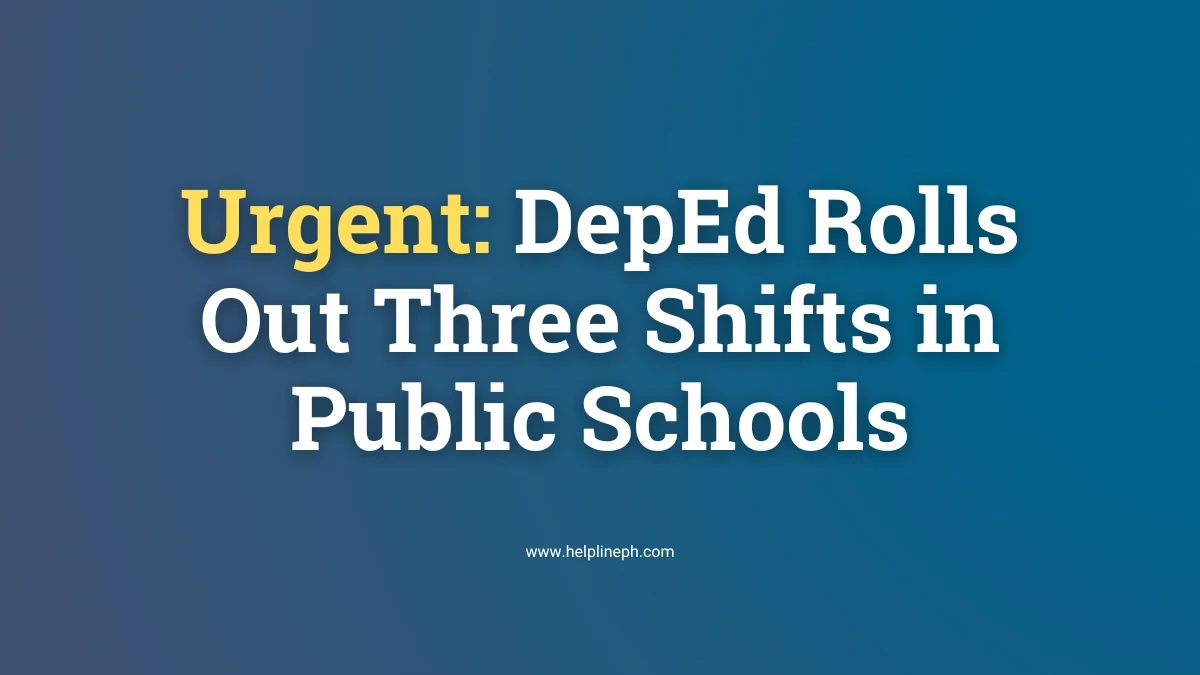The Department of Education (DepEd) has announced the implementation of a three-shift class schedule in public schools to address the pressing issue of classroom shortages. With a deficit of 165,443 classrooms nationwide, this measure aims to maximize the use of existing facilities and ensure that all students have access to education.
The Classroom Shortage Crisis
DepEd Secretary Sonny Angara acknowledged the severity of the classroom shortage, stating that relying solely on the department’s current budget would take approximately 30 years to resolve the issue. The shortage has led to overcrowded classrooms, with some schools forced to conduct classes in multiple shifts to accommodate all students.
Implementing Three Shifts
To alleviate overcrowding, DepEd is introducing a three-shift system in public schools. This approach divides the school day into three separate sessions, allowing more students to attend classes without the need for additional classrooms. The shifts are typically scheduled as follows:
- Morning Shift: 6:00 AM – 10:00 AM
- Midday Shift: 10:30 AM – 2:30 PM
- Afternoon Shift: 3:00 PM – 7:00 PM
This system aims to reduce class sizes and provide a more conducive learning environment for students.
Online Classes for Senior High School
In addition to the three-shift schedule, DepEd plans to implement online classes for Senior High School students. This strategy is designed to free up physical classrooms for lower grade levels, ensuring that younger students have access to in-person learning. By shifting older students to online platforms, DepEd hopes to optimize the use of available resources.
Public-Private Partnerships (PPP)
To expedite the construction of new classrooms, DepEd has partnered with the Public-Private Partnership (PPP) Center. This collaboration aims to build 15,000 classrooms in 2025, with plans to construct up to 100,000 classrooms in the coming years. The initiative is expected to benefit over 600,000 learners nationwide.
Challenges and Considerations
While the three-shift system and online classes offer immediate solutions, they also present challenges:
- Reduced Instruction Time: Shorter class periods may impact the depth of instruction and student comprehension.
- Teacher Workload: Extended school hours could lead to increased fatigue and burnout among educators.
- Digital Divide: Not all students have access to reliable internet or devices for online learning, potentially widening educational disparities.
DepEd must address these concerns to ensure the effectiveness of the implemented strategies.
Long-Term Solutions
Beyond immediate measures, DepEd is exploring long-term solutions to the classroom shortage:
- Infrastructure Development: Accelerating the construction of new classrooms through PPPs and government funding.
- Alternative Learning Systems: Expanding programs like the Alternative Learning System (ALS) to provide flexible education options.
- Curriculum Reforms: Adapting curricula to suit different learning modalities and schedules.
These initiatives aim to create a more resilient and inclusive education system.
Frequently Asked Questions (FAQs)
What is the reason behind implementing three shifts in schools?
The three-shift system is a response to the significant shortage of classrooms, allowing more students to attend classes by maximizing the use of existing facilities.
How will online classes for Senior High School students be conducted?
Senior High School students will participate in online learning platforms, reducing the demand for physical classroom space and enabling younger students to have in-person classes.
What measures are in place to support teachers under the new schedule?
DepEd is working on providing additional support and resources to teachers, including training for online instruction and adjustments to workloads to prevent burnout.
How does the PPP initiative help address the classroom shortage?
The PPP initiative involves collaboration with private entities to fund and expedite the construction of new classrooms, aiming to significantly reduce the backlog in a shorter timeframe.
The implementation of three-shift schedules and online classes by DepEd represents a proactive approach to addressing the pressing issue of classroom shortages in the Philippines. While these measures offer immediate relief, sustained efforts through infrastructure development and educational reforms are essential to ensure long-term solutions for the country’s education system.






